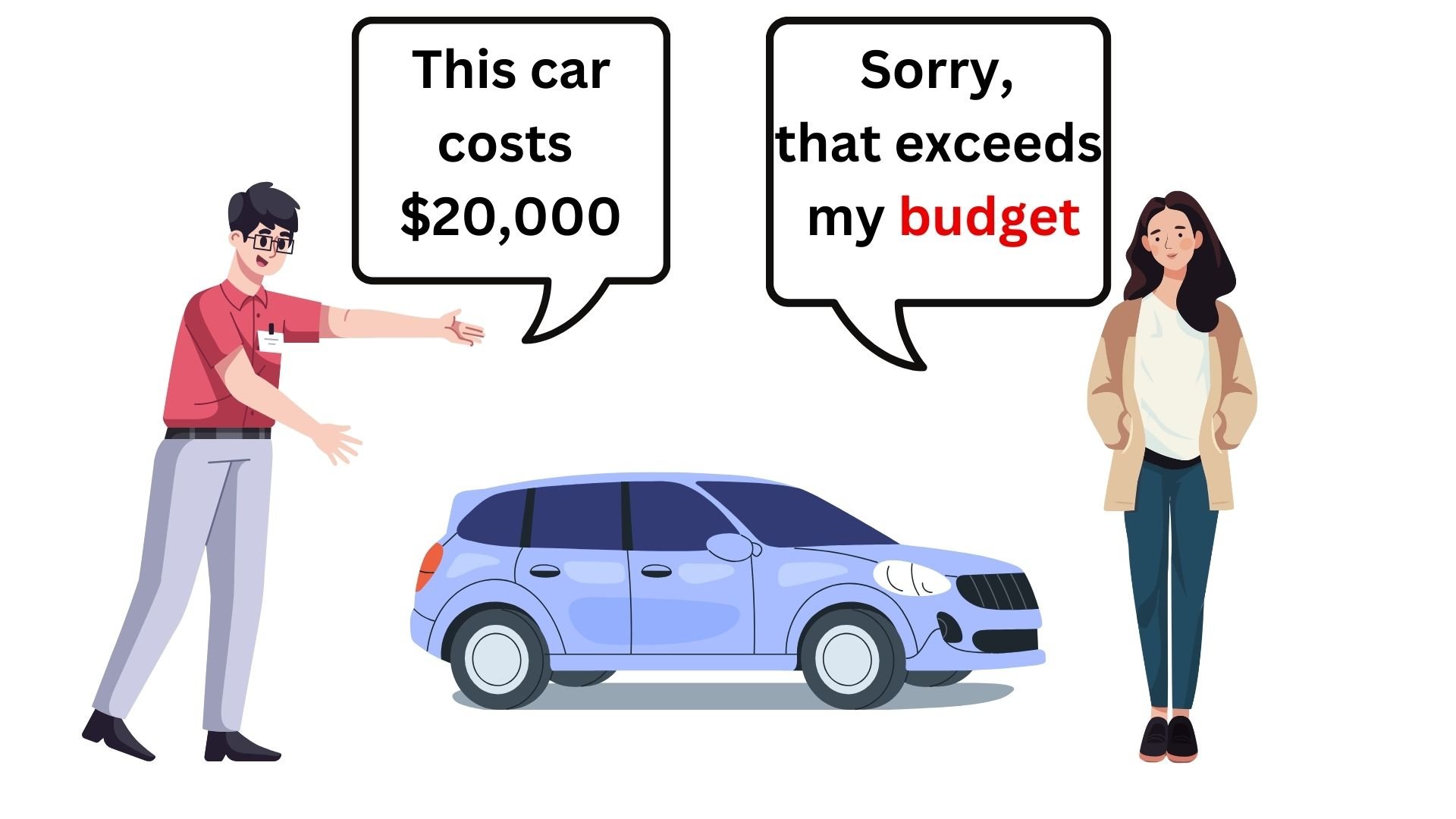The term budget, which can function as a verb, noun, or adjective, carries multiple meanings. It can refer to an estimate of total costs for a project or a prediction of expenditures and revenues over a designated future period. Additionally, it might denote the allocated funds for a project, product, or department.
On a personal note, if an item is “within your budget,” it signifies that you can afford it. Conversely, if it’s “outside your budget,” it’s beyond your financial means. In essence, being within or outside one’s budget reflects one’s financial capacity to make a purchase.
Personal Finance – Money Available to Spend
The term budget can refer to how much money someone has available to spend on something.
Imagine you are buying a car. The sales person shows you a car that costs more than you had planned to spend. You might say “Lovely car, but I am afraid it exceeds my budget.” You might then ask what cars they have up to a certain price.

In this image, the woman’s budget is how much money she has put aside to buy a car, In other words, how much she can afford.
If someone says, “That’s a great product, but I had not budgeted for that amount,” it means they cannot afford it. They had planned to spend less than the price of that product.
Households often create monthly budgets to track rent or mortgage payments, utility bills, groceries, and other expenses. If they find themselves running out of funds before the end of the month, they might adjust how much they allocate to non-essential items, ensuring they can cover all necessities.
Surplus, Deficit, & Balanced Budgets
When the term refers to estimating revenues and expenses over a future period, we regularly compile and re-evaluate it. Here are three types of budget estimates:
Surplus Budgets: these indicate that we predict revenues will exceed expenses. In other words, we forecast a profit.
Deficit Budgets: these, on the other hand, indicate that we expect expenses to exceed revenues.
Balanced Budgets: these indicate that we predict an even balance between revenues and expenses. In other words, we forecast that revenues and expenses will be equal.
In Business
A budget may be a plan that we express in money. We prepare and approve it before the financial period. It typically shows income and expenditure. Sometimes it also includes the capital that the company is going to employ.
Applies to Many Entities
Budgets are not only made for companies. Countries, governments, multinational organizations, and even private individuals use budgets. All entities that make, receive, and spend money have budgets.
It is a microeconomic concept that shows the trade-off made when we exchange one good for another.
Budget – Adjective
If you go on a ‘budget vacation,’ it means a cheap vacation. If a customer at a car rental sales room says: “I’d like to rent a budget car,” it means he or she wants a cheap one.
In other words, when the word is an adjective, it nearly always means ‘cheap.’
The Budget – UK
The British Government explains how it will spend the nation’s money for the next 12 months every year. This happens in March.
The Government also announces how it will collect enough funds to pay for that spending.
This announcement is called The Budget.
The Chancellor of the Exchequer calculates how much the Government will spend and collect in taxes. People who work in the Treasury help the Chancellor with the calculations. The equivalent of the British Chancellor in other countries is the Minister of Finance.
Like all others across the world, the UK Government gets its money through taxes. The Chancellor explains the changes in taxes over the next 12 months.
Flexible Budgets
Companies have fixed and variable costs. Fixed costs remain the same all the time. Variable costs, on the other hand, change from month to month. Hence the word ‘variable.’
Flexible budgets reflect the changing variable costs. When factory activity, for example, rises, the flexible budget or financial plan grows. Conversely, when it declines, the amount in the financial plan shrinks.
Flexible budgets contrast with static budgets.
Etymology
Etymologists (people who study the origin of words) say the English word ‘budget’ appeared in the early fifteenth century. At that time, it meant a ‘leather pouch.’ It came from the Middle French word bougette. Bougette is the diminutive of Old French bouge, meaning a ‘pouch, wallet or leather bag.’
The French word originated from the Latin bulga, meaning a ‘leather bag.’
It was not until 1733 that budget assumed its modern financial meaning. The Treasury Minister used to keep his fiscal plans in a leather wallet.
